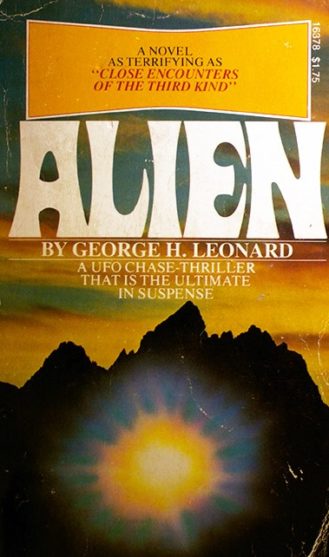By GEORGE H. LEONARD (Playboy Press; 1977)
It’s really too bad about this novel: it contains many good things, a robust page-turning narrative foremost among them, but is marred by some seriously flat prose.
Not to be confused with a certain other similarly titled story, this ALIEN involves John Mortala, an eccentric billionaire obsessed with UFOs. He devises a scheme in which he agrees to pay $1,000,000 (an amount that obviously went a lot farther back in ’77 than it does now) for physical proof of the existence of flying saucers. Selected for the undertaking is the cash-strapped astronomer Loren Durkey, who despite his skepticism about the existence of UFOs agrees to undertake the challenge.
Not to be confused with a certain other similarly titled story, this ALIEN involves John Mortala, an eccentric billionaire obsessed with UFOs.
This entails the companionship of a sexy southern gal named Flassie, provided by Mortala to take care of Loren’s sexual needs (his marriage having conveniently dissolved in the early pages), and a trip to Ecuador, in whose mountains a flying saucer is said to hover each night. Later Loren and Flassie travel to Saskatchewan, where another saucer is alleged to suck up water from a local lake.
I won’t say what occurs on these expeditions, but will reveal that Loren gets the physical UFO proof he desires. This unfortunately proves to be something of a curse, as he’s pursued by others who want the million dollars offered by Mr. Mortala, and aren’t above committing murder to get it, and also the unseen aliens, who want their property returned.
The popular seventies-era theories of CHARIOTS OF THE GODS‘ Erich von Daniken (who claimed humankind was descended from aliens) are accounted for in these pages, which also contain a fair amount of derring-do on the parts of Loren and Flassie, some frank sexuality and CLOSE ENCOUNTERS OF THE THIRD KIND-esque alien encounters. It’s here, alas, that the author’s unadorned prose really becomes an annoyance. Such studied nondescriptive writing works adequately for the most part, but fails completely when it comes to laying out the details of the extraterrestrial spacecraft that come to increasingly dominate the proceedings, with sentences like “A hatchway opened in the seamless side of the disc and he walked on up the ramp and the hatchway closed behind him” failing to communicate much of anything but annoyance.

